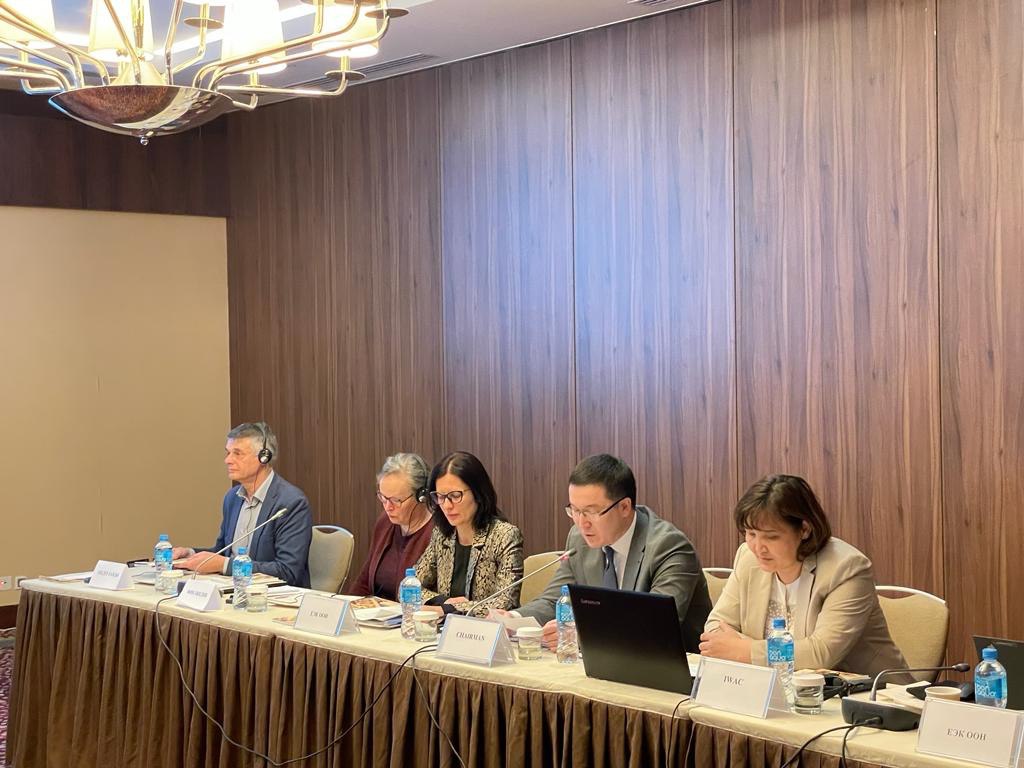Experts from Central Asian countries discussed issues of cooperation in the field of monitoring, assessment and exchange of information on water resources

Today, the Regional Workshop on Monitoring, Assessment and Information Sharing in Transboundary Basins in Central Asia, organized by the International Water Assessment Centre jointly with the United Nations Economic Commission for Europe and with the financial support of the Green Central Asia Initiative implemented by the German International Cooperation (Deutsche Gesellschaft für Internationale Zusammenarbeit (GIZ) GmbH), started its work in Astana.
The workshop is attended by experts from five countries of Central Asia (Kazakhstan, Kyrgyzstan, Tajikistan, Turkmenistan and Uzbekistan), representing state bodies and national services responsible for water resources, the environment and hydrometeorology, as well as specialists from scientific institutions, basin water management organizations, and international organizations operating in the region. It also brings together experts from Finland, Germany, the Netherlands, the World Meteorological Organization, International Sava River Basin Commission, International Network of Basin Organizations and International Groundwater Assessment Centre.
In the context of population growth, development of water-consuming sectors of the economy and impact of climate change in Central Asia, the problem of water shortage is exacerbated every year. Insufficient attention to environmental safety issues in the past, continued practice of irrational water use, lack of institutional capacity and a number of other factors have led to degradation of ecosystems, pollution of water bodies and deterioration of water quality. Such threats require adoption of adequate measures and development of joint approaches to management and protection of water resources, including development of a system for monitoring and assessment of water resources, which makes it possible to make informed and sustainable decisions.
The workshop was organized to assist countries in studying international experience in monitoring, assessment and sharing information in transboundary basins and discussing the possibilities of strengthening cooperation between the countries of Central Asia in the field of protection and use of water resources in transboundary basins.
Participants of the workshop will review various practices and approaches to monitoring, assessment and sharing of information in transboundary basins, including the use of consistent and comparable assessment methods and development of data management systems.
They will also discuss proposals that will be included in the new publication "Good Practices and Lessons Learned in the Field of Transboundary Data Exchange", developed under the auspices of the Convention on the Protection and Use of Transboundary Watercourses and International Lakes.
During the workshop, it is expected to discuss the existing problems in the implementation of joint monitoring and assessment of water resources in Central Asia, as well as to identify common approaches to the development of cooperation between countries in the protection and use of water resources.
In addition, the workshop is expected to discuss preparations for the UN Water Conference, which will be held on March 22-24, 2023 in New York under the chairmanship of Tajikistan and the Netherlands.
For reference: Joint monitoring and assessment of transboundary waters are among the key obligations of the Convention on the Protection and Use of Transboundary Watercourses and International Lakes. As part of its implementation, a number of guidance documents have been developed on methods for creating systems for monitoring and assessment of transboundary waters.
With the Green Central Asia Initiative, the Federal Foreign Office invited its long-standing partner countries in Central Asia to engage in a political dialogue process on climate, environment and security. Green Central Asia is implemented by Deutsche Gesellschaft für internationale Zusammenarbeit (GIZ) GmbH, Helmholtz-Centre Potsdam - German Research Centre for Geosciences (GFZ) with the Martin Luther University Halle-Wittenberg, Potsdam-Institute for Climate Impact Research (PIK) and the German-Kazakh University (DKU). This Initiative bolsters the German foreign policy topic ‘climate and security’ within the framework of the United Nations and supports the implementation of SDG 6 (clean water and sanitation), SDG 13 (climate action) and SDG 15 (life on land). The Initiative also contributes to the efforts enshrined in the new EU Strategy on Central Asia of June 2019 which provides a new policy framework for EU engagement with the countries of Central Asia and focuses on promoting resilience, prosperity and regional cooperation. It is also part of the Team Europe Initiative (TEI) on Water, Energy and Climate Change in Central Asia / Global Gateway.
More information you can find here: www.greencentralasia.org